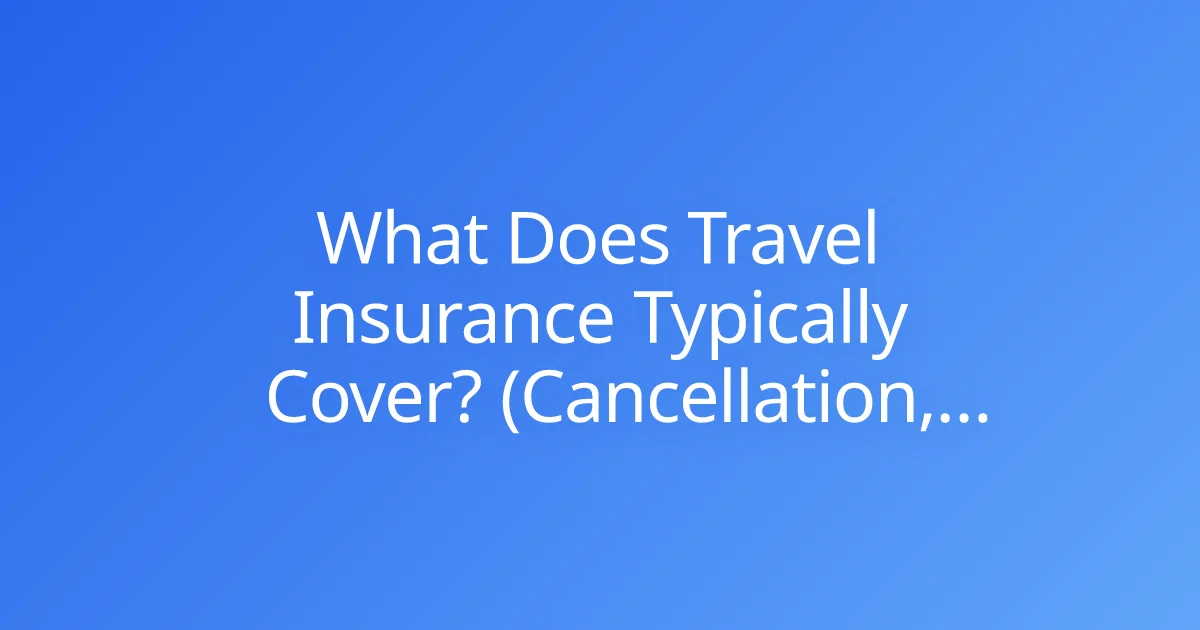Travel Insurance: Is It Worth Buying for Your Next Trip?
You've meticulously planned your dream vacation, booked your flights, reserved accommodations, and curated a perfect itinerary. But what happens if an unexpected illness forces you to cancel last minute? Or your luggage goes missing in transit? What if you face a medical emergency in a foreign country? These unforeseen events can quickly turn a highly anticipated adventure into a financial and logistical nightmare. For many travelers, the question then arises: Is Travel Insurance worth buying for your next trip?
At The Policy Explainer, we understand the anxieties that can accompany travel, especially when faced with the unknown. This comprehensive guide will demystify Travel Insurance, breaking down its core components, explaining the critical protections it offers, and providing a clear framework for you to assess whether this form of travel protection is a valuable investment for your specific journey. Our goal is to empower you to make an informed decision, ensuring your focus remains on enjoying your trip, not worrying about what could go wrong.
What is Travel Insurance? Your Trip's Safety Net
Travel Insurance is a type of insurance designed to protect travelers from financial losses and medical emergencies that can occur before or during a trip. It's a contractual agreement where, in exchange for a premium, the insurer agrees to cover specific losses related to your travel plans.
It's important to understand that Travel Insurance is distinct from other forms of personal insurance, such as your health or homeowners insurance, which often provide very limited or no coverage for international travel or trip-related financial losses. A dedicated travel protection plan fills these critical gaps.
Key Coverages: What Does Travel Insurance Protect?
While specific policies vary, most comprehensive Travel Insurance plans offer a robust set of coverages that address the most common travel-related risks.
1. Trip Cancellation and Interruption Coverage
This is one of the most frequently utilized benefits and provides financial protection if your trip is unexpectedly cut short or can't begin at all.
- Trip Cancellation: Reimburses you for non-refundable trip costs (flights, hotels, tours) if you have to cancel your trip before it starts due to a covered reason. Covered reasons typically include:
- Sudden illness or injury of the traveler or a family member.
- Death of the traveler or a family member.
- Severe weather preventing travel.
- Terrorist acts in your destination.
- Job loss or job relocation.
- Trip Interruption: Reimburses you for the unused portion of your trip and often covers extra expenses (like a last-minute flight home) if your trip is cut short after it has begun due to a covered reason.
- Why it's Essential: Protects the often significant financial investment you've made in your vacation or business travel, guarding against unforeseen circumstances that can prevent you from traveling.
2. Medical Emergencies and Evacuation Coverage
This is arguably the most critical component, especially for international travel, as your domestic health insurance may not cover you abroad.
- Emergency Medical Treatment: Pays for emergency medical expenses incurred during your trip, including doctor's visits, hospital stays, prescription medications, and emergency surgeries.
- Emergency Medical Evacuation: Covers the cost of medically necessary transportation to the nearest adequate medical facility, or even back home, if your condition requires it. This can cost tens or hundreds of thousands of dollars without insurance.
- Why it's Essential: Healthcare costs, especially in foreign countries, can be astronomical. A sudden illness or injury can lead to financial ruin without this coverage, and most standard health plans do not offer sufficient, if any, overseas coverage.
3. Baggage Loss and Delay Coverage
Protects your personal belongings during your travels.
- Baggage Loss: Reimburses you for the value of lost, stolen, or permanently damaged luggage and its contents.
- Baggage Delay: Provides a per diem amount to purchase essential items (like toiletries, a change of clothes) if your checked luggage is delayed for a specified period (e.g., 6 or 12 hours).
- Why it's Essential: While airlines have some liability for lost bags, it's often limited. This coverage offers broader protection and immediate relief for essential items.
4. Travel Delay Coverage
Addresses unexpected holdups during your journey.
- What it Covers: Reimburses you for reasonable, unplanned expenses (meals, accommodation) if your travel is delayed for a specified period (e.g., 3, 6, or 12 hours) due to a covered event like severe weather, mechanical issues, or natural disasters.
- Why it's Essential: Provides a financial cushion and reduces stress during unexpected airport or transportation delays.
The "Is It Worth It?" Question: Weighing the Benefits
Deciding whether Travel Insurance is worth buying for your next trip comes down to balancing potential risks against the cost of the premium.
1. Peace of Mind
For many, the biggest benefit isn't the financial reimbursement, but the sheer peace of mind. Knowing that you're protected against major unforeseen events allows you to relax and enjoy your trip without constant worry about potential financial or medical setbacks. This psychological benefit is often invaluable.
2. Financial Protection for Significant Investments
If your trip is a substantial financial investment – an expensive cruise, a multi-destination international tour, or a non-refundable package – the potential loss if you have to cancel or interrupt can be immense. Travel Insurance protects that investment.
3. Access to Assistance Services
Many Travel Insurance policies come with 24/7 emergency assistance services. These services can be lifesavers, helping with:
- Locating the nearest reputable medical facility.
- Translating medical records.
- Arranging emergency travel arrangements.
- Assisting with lost passports or travel documents.
- Coordinating communication with family members.
These services offer crucial support when you're far from home and facing a crisis.
4. Gaps in Existing Coverage
As noted, your credit card, homeowners insurance, or health insurance often have significant limitations when it comes to travel.
- Credit Cards: May offer some basic trip cancellation or baggage delay, but rarely comprehensive medical or evacuation coverage.
- Homeowners/Renters Insurance: Might cover theft of belongings, but usually limited abroad and not for delayed baggage.
- Health Insurance: Often has limited or no coverage outside your home country, and definitely no medical evacuation coverage.
Travel insurance specifically fills these critical gaps.
Factors That Influence Whether You Need It
While the benefits are clear, Travel Insurance isn't always a must-have for every single journey. Consider these factors to determine if it's right for your next trip:
1. Cost of Your Trip
- High-Cost Trips: If your non-refundable expenses (flights, accommodations, tours, cruises) are substantial, the financial risk of cancellation or interruption is high.
- Low-Cost Trips: For a short, inexpensive trip with easily refundable elements, the cost of insurance might outweigh the potential loss.
2. Health Considerations
- Pre-Existing Conditions: If you or a traveling companion have pre-existing medical conditions, look for policies that specifically cover them (often requiring purchase early after the initial trip deposit). This is paramount for avoiding uncovered medical emergencies.
- Adventure Activities: If your trip involves high-risk activities (e.g., diving, climbing, extreme sports), standard policies might exclude these. You'll need specialized adventure travel insurance.
3. Destination and Activities
- Remote/High-Risk Locations: Traveling to remote areas or countries with unstable political situations increases the need for robust medical evacuation and security evacuation coverage.
- Foreign Healthcare Systems: If your destination has expensive or difficult-to-access healthcare, insurance is critical.
4. Existing Coverage
- Credit Card Benefits: Review your credit card's travel benefits. They might offer basic trip cancellation or baggage delay, but rarely comprehensive medical.
- Employer-Provided Benefits: Some companies offer travel benefits, especially for business travel.
- Homeowners/Renters Insurance: Check if any of your personal belongings are covered abroad.
5. Traveler Type
- Solo Travelers: May need more robust emergency assistance.
- Families with Children/Elderly: Increased risk of medical emergencies or unexpected cancellations.
- Group Travel: If one person's cancellation impacts the whole group, insurance can protect everyone's investment.
Types of Travel Insurance Policies
Just as there are different types of trips, there are different Travel Insurance policies to match your specific needs.
1. Single Trip Policies
- Description: Designed to cover one specific trip, from departure to return.
- Best For: Individuals or families taking a single, often significant, vacation per year.
2. Multi-Trip or Annual Policies
- Description: Provides coverage for an unlimited number of trips within a 12-month period. Each trip typically has a maximum duration limit (e.g., 30 or 60 days).
- Best For: Frequent travelers (e.g., business travelers, digital nomads) who take multiple trips throughout the year. Often more cost-effective than buying multiple single-trip policies.
3. "Cancel For Any Reason" (CFAR) Insurance
- Description: An upgrade or standalone policy that allows you to cancel your trip for any reason not covered by a standard policy and still get a partial reimbursement (typically 50-75% of your non-refundable costs).
- Best For: Travelers who want ultimate flexibility and protection against highly unlikely or uninsurable scenarios (e.g., sudden change of mind, fear of travel). It's more expensive and has strict purchase deadlines.
4. Specialized Coverage
- Adventure/Sports Travel Insurance: For high-risk activities like mountaineering, skydiving, or competitive sports, which are often excluded from standard policies.
- Cruise Travel Insurance: Tailored for cruise-specific risks like missed connections, cabin confinement due to illness, or on-board medical care.
- International Health Insurance (Long-Term): For expats or digital nomads living abroad for extended periods, this is a different product than short-term travel medical insurance.
Choosing the Right Policy: Smart Tips
Once you've decided Travel Insurance is worth buying for your next trip, follow these tips to ensure you get the best coverage.
1. Read the Fine Print (Policy Wording)
This is paramount. Insurance policies are contracts. Understand what is covered, what is excluded, and under what conditions benefits are paid. Pay close attention to:
- Covered Reasons: For cancellation/interruption.
- Benefit Limits: The maximum amount the policy will pay for each coverage type.
- Deductibles: The amount you pay out-of-pocket before coverage kicks in.
- Exclusions: What the policy doesn't cover (e.g., pre-existing conditions without a waiver, certain high-risk activities, self-inflicted injuries).
2. Compare Providers and Quotes
Don't settle for the first quote you receive. Use comparison websites or work with an independent insurance broker to compare policies from multiple reputable providers. Look beyond price and focus on value, coverage limits, and customer service reviews.
3. Understand Pre-Existing Condition Waivers
If you have a pre-existing medical condition, ensure the policy offers a waiver for it. This typically requires you to purchase the policy within a specific timeframe (e.g., 10-21 days) of your initial trip deposit and insure the full non-refundable cost of your trip.
4. Purchase Early
For comprehensive policies, especially those covering pre-existing conditions or "Cancel For Any Reason," it's crucial to purchase the policy shortly after making your first trip deposit. Many key benefits have strict eligibility windows tied to this "initial deposit date."
5. Keep Policy Documents Accessible
Store your policy number, emergency contact numbers, and a summary of your benefits (digital and/or printed) in an easily accessible place during your trip.
Conclusion
The question of is Travel Insurance worth buying for your next trip doesn't have a universal "yes" or "no" answer, but for most significant journeys, the answer leans strongly towards a resounding yes. While no one anticipates a medical emergency or a sudden cancellation, these unforeseen events can quickly transform a dream vacation into a financial and emotional ordeal. By understanding the critical protections offered by Travel Insurance, particularly for medical emergencies, trip cancellations, and baggage issues, you gain invaluable peace of mind and safeguard your financial investment. Making an informed decision about this essential travel protection allows you to fully immerse yourself in the joys of exploration, knowing that your trip is covered against the unexpected. Do you have more questions about how specific travel risks relate to policy coverages or navigating a travel insurance claim?



